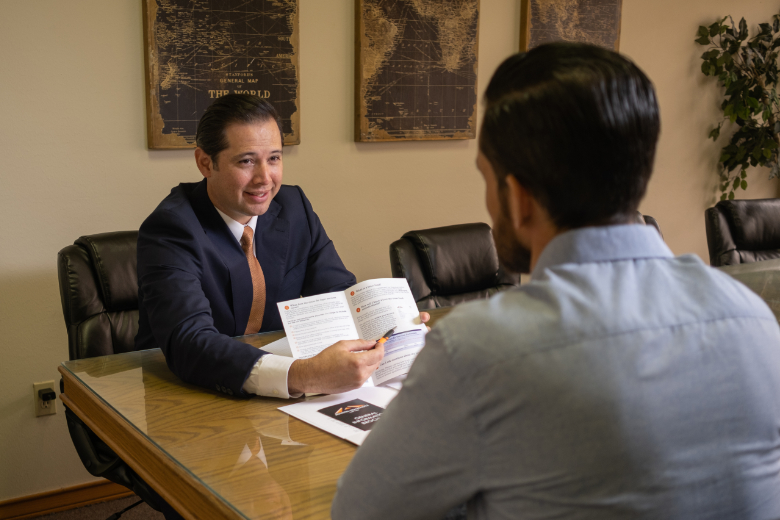
When you are faced with a legal issue, particularly in the area of Family Law, one of the first questions that might come to mind is, “How much is this going to cost me?” As an attorney, I understand that this is a concern for clients and here at my firm, we try our best to control costs for clients.
But at the end of the day, an attorney goes to school for 3 years, continues his or her education by attending up to 15 hours of Continuing Legal Education (CLE) courses annually, required by the state bar, and practices each day to sharpen his or her skills in specific areas of law over time to become more experienced. This results in results for clients, or an outcome for their case that they are happy with. The more experienced an attorney is, the more valuable their time is.
As a matter of ethics, I can never guarantee my results. I can only promise that I will work hard for you and that my firm will be as responsive as possible to your legal needs. But consider that hard work takes time, effort, and manpower that does not come for free. If practicing law was easy, people would not hire attorneys and would represent themselves in all matters whether simple or complex.
Consultation Fee: Why do our firm charge a fee?

The first interaction you will have with our firm is the consultation. For a Family Law matter, we charge $100 as a sitting fee with the attorney. This means you will meet or speak directly with the attorney, not a paralegal or other staff member.
The consultation allows the attorney to evaluate your case, advise you on whether you have a case or not, and share with you, based on his experience, whether he believes the legal system will allow him to represent you in a way that will reach the goals you have in mind for your legal matter.
The attorney will interview you, ask you questions, allow you time to ask your own questions, provide responses to your questions, and provide you with a quote for the retainer fee for legal services. The consultation process will take about an hour of time.
We believe that because we have invested much time and energy into studying Texas family laws and case laws, the information the attorney provides during your consultation is valuable. This information has taken years to learn and acquire. It is a specialized skill to be able to research the extensive volume of reading that is the Texas Family Law Code.

Just to give you an idea, the Texas Family Law Handbook is approximately 1,200 pages. The handbook itself is over $300. Still, the handbook includes only some of the court case decisions that affect how the law is interpreted. Outside of that, there are databases we access that that add to the vast amount of information a family law attorney needs to know and be able to research. During the consultation, the attorney will share information he has learned that applies to your specific situation and give you advise about what your options are to move forward. He will tell you what your rights are and what the rights of the opposing party are. In many instances, the information I have is different, more thorough, or more specific to your situation then what you kind find from a simple Google search.
For these reasons, I charge for my consultation.
Retainer Fee
Standard practice for Family Law cases is that attorneys will charge a legal retainer fee.
A legal retainer is a fee paid to a lawyer before any services have been performed. The client must agree to the retainer amount and understand what services will be performed. The retainer agreement is described in the Agreement for Representation, or the contract you sign binding your relationship with the attorney. The Agreement for Representation typically includes the type of work the attorney is doing for the client, any associated fees, and the general rights and duties of both parties entering into the agreement.
How does a law firm determine what fee to charge a client?
Over time, we have collected data from our electronic client management systems, the systems we use to manage cases, to determine the approximate time a case may take to finish. We add up all the time it takes for paralegals and the attorney to finish common tasks for each case. We multiple that time by the attorney and paralegal rates and then from there we can make a determination about how much a case might take to finish.
What happens to the legal retainer fee once I hand it over to the attorney?
This legal retainer fee is then placed into a special bank account that only attorneys may request from a bank. This account holds all client retainer fees in mini accounts that are not accessed until the attorney invoices a client with the work that he or she has completed within a certain time period, usually a month. Whatever the amount of work was for that month, it will be deducted from your legal retainer fee and transferred from the special bank account to the attorney’s operating account.
Billing 101
Legal billing practices adopted by attorneys in the 70s and 80s continues to today. The general format is that attorney’s bill is hourly. But those hours are broken down into 6-minute intervals, or slices. This is equal to 10 slices in 1 hour. A phone call that takes 6 minutes or less will be billed at 0.10 times the hourly rate of the attorney or paralegal. For example, at our firm, the hourly rate of the paralegal at our firm is $175. In short, 0.10 times $175 is $17.50.
Usually on a monthly basis, our firm will email an invoice of services. We ask that you review your invoice carefully as it explains the services the firm performed throughout the month, the date those services were completed, the fee which is multiplied by the time entered for that service (0.1 -1.0 or more representing those 6-minute increments), and total cost of each itemized service. The total is the amount to be drawn from your trust fund for that month. And you will also be able to keep track of how much money is remaining in your trust account on that same invoice.
What happens if my case becomes more intense and my trust account runs low?
If your trust fund balance run lower than $500 and it is determined that your matter needs more than an 1-2 hours of work, you will need to replenish your trust fund at least up to $1,000. This will require an additional payment known as a trust fund request.
The attorney or an agent of the firm will contact you to inform you of what additional services are needed to complete your matter. At the end of the case, if the funds have not been used, you will be refunded the amount remaining in your trust fund.
Why didn’t the legal retainer paid at the beginning of my services cover all my legal expenses?
When we first receive your case, we base our retainer fee on cases we have previously serviced that are similar to yours. But every case is different and each client has unique needs that require different lengths of attention and efforts. Additionally, some cases take different paths than expected due to events that occur during the case.
Our firm tries to be as cost effective as possible but cannot compromise the time and effort it takes to give a superior result. We ask that you trust the firm’s guidance, and if at any time you have questions about the strategies being used to achieve the goals of your case and the costs associated with it, please reach out to the firm.